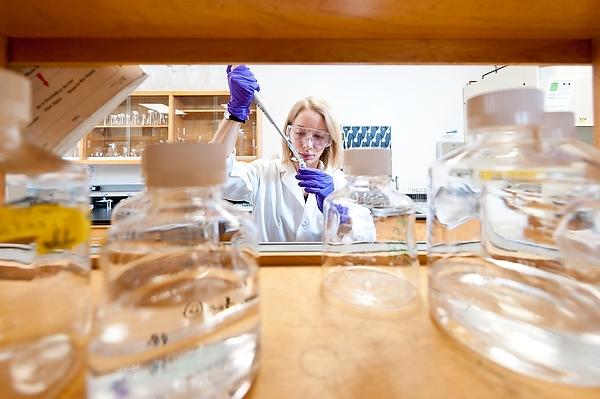The Wittig Feminist Biology Initiative is a program through the University of Wisconsin Department of Gender and Women’s Studies funded by an estate gift from the late biologist Gertraude Wittig.
According to the Center for Research on Gender and Women Director Christine Garlough, Wittig was born in East Germany in 1928 before she fled to West Germany and earned a doctorate in zoology and botany. She then earned a scholarship to come to the U.S. and study insect pathology at the University of California–Berkeley. As a woman who faced resistance in her field, she became passionate about women in science and research.
Wittig was also an active member of the Association of Women in Science and wanted to find a gender and women’s studies program in the U.S. worthy enough to leave her estate to. She chose UW under the condition that the university create the Feminist Biology Initiative, Garlough said.
The Center for Research on Gender and Women supports the Feminist Biology Initiative, Ethics of Care Initiative and the Sexual Violence Research Initiative, according to the CRGW website. All three operate at the intersection of feminism and biological research.
According to former director of the initiative Janet Hyde, one part of the program requires that a person has just gotten their Ph.D. and works in feminist science or feminist science studies. This post-doctoral fellowship requires the fellows to teach one class on a concept relating to their fellowship per semester. The Wittig fellowship website also said there is a five-page research proposal and approval from a host lab required to apply.
Aside from the outstanding research done by the fellows, the overarching goal of the entire initiative is to reevaluate the way that scientists and average people view biology. Hyde said the initiative tries to remake the current field of biology to include a feminist component and gender-fair research. This is what the initiative calls their national approach.
Every two to three years, the directors and board choose a new fellow. According to Garlough, they are chosen based on the rigor of their research, their innovative ideas and their willingness to get involved in the vibrant culture of the department.
Garlough said working in this department has been a highlight of her career and those involved do everything they can to support individual research projects. The department has a vibrant, welcoming community that Garlough could “talk about for hours.”
The scope of work the fellows have covered over the past 10 years of this program is large. Hyde said a past fellow was biological anthropologist Caroline VanSickle, who went on archeological digs, finding female skeletons. She is now a professor of anatomy who focuses on the development and evolution of the female skeleton at Des Moines University.
The 2016-2018 fellow Ann Fink studies the ethics of neuroscience concerning gender, mental health and social justice while also incorporating visual art for science communication, according to Hyde.
The 2020-2022 fellow was Kelsey Lewis, who Hyde said moved to become a professor in the Department of Gender and Women’s Studies at the University of Buffalo in New York. Her work focused on prenatal sex development and the science behind the way sex develops past a fertilized egg.
A second part of the program, Garlough and Hyde said, is the Wisconsin Symposium for Feminist Biology. This symposium occurs every two to three years and brings in scientists and researchers from all over the country. It gives a space for undergraduates, graduates, scientists and even medical doctors to come together and talk about cutting-edge research in the feminist biology field.
“There is a range of different disciplinary approaches and fields that have been represented, and it all involves bringing attention to issues that have not been addressed substantially,” Garlough said.
In the most recent symposium in 2021, professor in the Department of Ecology and Evolutionary Biology at the University of California, Los Angeles Patricia Gowaty gave the keynote speech on evolutionary biology and how it specifically relates to women, according to the symposium website.
Other talks from the symposium included, “Endometriosis Patients and the Institution of Medicine” and “Reproducing the Environment: Mercury and Parent/Child Health in Amazonian Small-Scale Mining Communities,” among others, according to the symposium website.
By promoting female-based biology research at the UW and hosting the Wisconsin Symposium on Feminist Biology, those involved with the initiative hope to make a national impact on the way biology progresses and honor the legacy of Wittig, Hyde said.


















